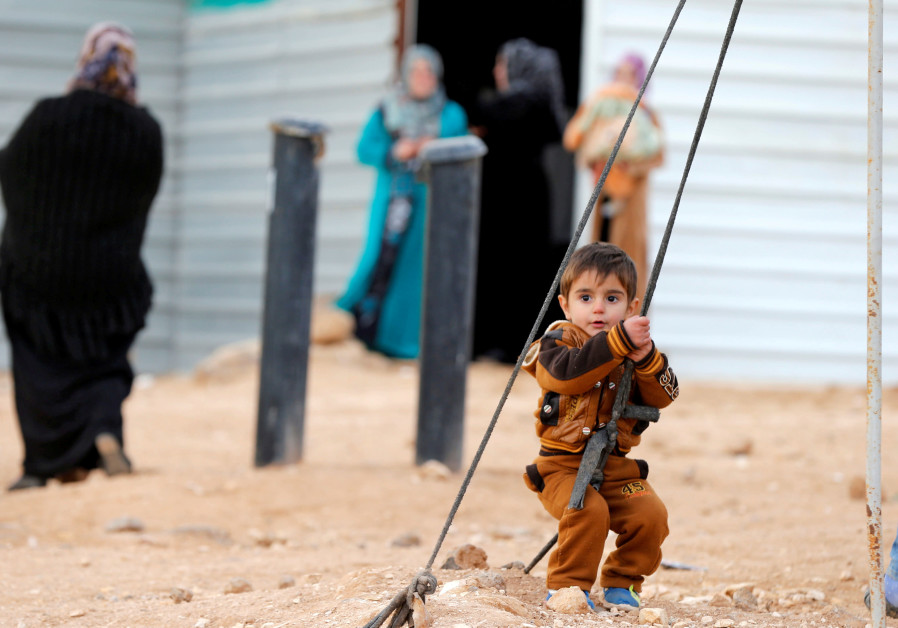Fear and uncertainty grip Syrians sheltering near Israel border

A Syrian refugee child plays in the Jordanian city of Mafraq, near the border with Syria, January 28, 2018.. (photo credit: REUTERS/MUHAMMAD HAMED)
“No one knows where it’s going,” said Dalton Thomas, founder and president of FAI Relief, as he checks on the tens of thousands of internally displaced Syrians seeking shelter alongside Israel’s Golan Heights border fence.
Since Jordan sealed its frontier with Syria last month after the Assad regime escalated its offensive against Deraa and rebel-held areas in the south, refugees near the Golan Heights have become completely reliant on aid transiting Israel, Thomas said. The crisis is likely to worsen regardless of whether the fighting continues in southern Syria, he cautioned.
FAI Relief, standing for Frontier Alliance International, is an evangelical Christian aid agency Thomas founded in Ellerslie, Georgia in 2012. The ministry has been working in Syria since 2017, partnering with Israel’s Operation Good Neighbor on medical missions to save lives and aid refugees.
In recent weeks its humanitarian aid has included 300 tents and more than 50 tons of aid, some donated by Israelis. Nic Walsh, an FAI Relief team leader, said she has seen the fear and uncertainty gripping the south Syrian refugees.
“People struggle to eat and sleep, and get their heads around the idea that this is the end,” she said. For them the “end” means the conclusion of the Syrian civil war that erupted in 2011 in Deraa in which more than 500,000 people have died. Now the regime, backed by Russia’s air force and Iranian-supported militias, is closing in on the rebels’ remaining pockets.
“We have been visiting people and encouraging them, letting them know we are still going to be here and support them,” she said.
Thomas noted that the situation for Syria’s internally displaced people has dramatically deteriorated in recent weeks after supply lines from Jordan were cut off. Since 2011 almost one million Syrians have fled to Jordan while humanitarian aid flowed north from Amman. But when the Syrian regime offensive began in early July, Jordan sealed its border stopping the aid.
Israel, which has been treating wounded Syrians over the course of the war, does not have an aid operation or international NGOs to pick up from Jordan. But with the most recent internally displaced people sheltering in Syrian villages around Quneitra, those IDPs are relying heavily on aid from the Israeli side, said Thomas.
“People are saying there is a ton of aid stuck in Jordan, and are appealing for this aid to go through Israel… The locals see Israel as the lifeline,” he added.
On Tuesday, Syrians with signs “appealing to the humanity to open the border” called on Israel to provide more relief aid. They claimed Russia has given a “green light” to murder them, and that “Israel should work to stop barbaric attacks against us now.”
With Prime Minister Benjamin Netanyahu meeting Russian President Vladimir Putin in Moscow on Wednesday, their appeal has taken on added urgency.
Thomas said medical clinics on the Syrian side of the Golan are half stocked, and that there is a “gaping hole” in the humanitarian needs. “There are hundreds of thousands of people in this region, and they are cut off,” he noted.
FAI Relief is trying to infuse hope amid the sorrow of war, he said.
“Regardless of what happens with the [Assad] regime, if it comes [down to the Golan border] there is no way the people in these communities will get what they need. They will be in just as dire a situation the day after as they were six months ago.”
No one will win in this conflict, Thomas warned. “The work actually begins the day after. We need to take terminology like ‘winning’ and ‘ending’ out of our vocabulary. It [the conflict] will just transform into new strife.”






Comments are closed.